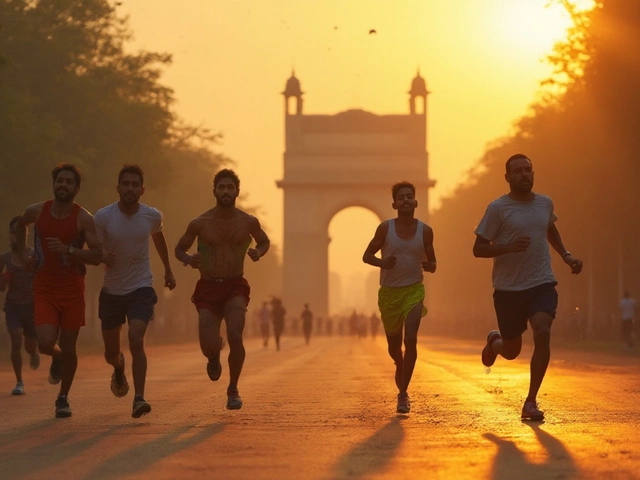So you're eyeing that marathon finish line and wondering if clocking it at 6 hours means you're slow. First off, let's clear the air. Running a marathon, no matter how long it takes, is a massive achievement. Plenty of folks out there are just aiming to finish, and if that's you, then you're already on a solid track.
A 6-hour marathon time works out to about a 13:44 pace per mile, or roughly 8:32 per kilometer. Now, on the running spectrum, some might see this as slow compared to seasoned marathoners, but let's be real here: it all boils down to personal goals and where you're starting from. If you've never run long distances before, 6 hours can be an intense challenge.
For first-timers or those running to finish, the main thing is sticking to the training plan that suits your lifestyle and progress. Being consistent with your training, focusing on building endurance, and making those miles enjoyable can help a lot. At the end of the day, if you're crossing that finish line, you're a marathoner—and that's something worth celebrating!
- Understanding Marathon Pacing
- What a 6-Hour Marathon Means
- Training Tips for Better Pacing
- Personal Goals and Progress
- Enhancing Your Marathon Experience
Understanding Marathon Pacing
Alright, let's talk pacing in marathons, which is basically just fancy talk for how fast you're running. Getting your pace right is like unlocking a superpower; it keeps you from burning out too early and helps you finish strong.
In marathons, pacing is all about finding that sweet spot where you can sustain your speed over those grueling 26.2 miles. For a 6-hour marathon, you’re looking at a pace of approximately 13:44 per mile, or about 8:32 per kilometer. Trust us, sticking to a planned pace can make a big difference, especially towards the end when every step feels like a mountain.
Why is pacing so important? It's simple: without a good strategy, it's easy to start too fast and end up struggling in the later miles. And we definitely want to avoid that! Experienced runners often use pace bands or watches to keep track of their speed throughout the race.
Here's a little breakdown of pacing strategies:
- Negative Splits: This is when you run the second half of the marathon faster than the first. It’s tough but can be super effective if you have energy left in the tank.
- Even Splits: Running at a consistent pace throughout the race. This is usually the easiest to manage mentally, as it doesn't require a sudden change effort mid-race.
- Positive Splits: Starting faster and slowing down towards the end. While common among beginners, it often leads to struggling the last few miles.
Many runners fall into the trap of starting out too fast due to adrenaline and excitement. Training your mind and body to avoid this can save you a lot of pain. It’s all about balance and finding what works for your body.
Not sure how you're doing pace-wise? Check out this little table that’ll give you an idea of splits for different mile markers if you're aiming for a 6-hour marathon.
| Mile Marker | Pace (min/mile) |
|---|---|
| 10k | 1:25:43 |
| Half Marathon | 2:52:48 |
| 20 Miles | 4:34:20 |
So whether you’re gunning for that marathon goal or just wanting to beat your own clock, understanding pacing is key. Keep these strategies in mind when training, and you’ll have a much smoother run come race day!
What a 6-Hour Marathon Means
Hitting that 6-hour mark in a marathon isn’t just about the numbers—it's more about what it says about your journey as a runner. For many first-time marathoners, a 6-hour marathon acts as an attainable yet challenging goal. It allows runners to balance endurance and patience, tackling one of the most grueling events without burning out prematurely.
Now, why exactly is that 6-hour time frame a big deal for some folks? Well, according to Marathon Handbook, finishing a marathon is an achievement most people never reach. In their survey of marathon finish times, about 13-14% of marathoners finish within 5:30 to 6:00. Therefore, running a marathon in 6 hours is not as uncommon as some might think.
"A 6-hour marathon finish is within reach for many people, but it requires diligent training, strategic pacing, and an understanding of personal limits." - Marathon Handbook
Let's cut to the chase: if you’re working hard, pacing yourself, and finishing strong without injury, you’re winning at your own race. A decent marathon time isn’t a one-size-fits-all and depends on factors like training, body type, and past running experience.
For those aiming for a marathon pace like this, here are a few pointers:
- Embrace Walking: Integrating walking breaks can help sustain energy levels and prevent fatigue, which is crucial when aiming for longer finish times.
- Focus on Endurance: Long runs are key. Gradually increase your mileage as your training progresses.
- Nutrition: Understanding what your body needs before, during, and after runs can make a big difference. Hydration and energy gels can be your best friends on race day.
It's also worth noting that many marathons have a cutoff time, typically around 6-7 hours. So, aiming for a 6-hour pace ensures you finish comfortably within limits. Remember, the real victory is how you feel crossing that finish line, knowing you've given it your all.

Training Tips for Better Pacing
Getting your marathon pace right can feel like a puzzle, but with some practical strategies, you'll be shaving off minutes in no time. Let's dig into a few tips that might help you speed up that marathon pace to meet your goals.
First things first, embrace the power of interval training. By mixing short bursts of speed with recovery periods in your runs, you're training your body to handle quicker paces without burning out. Think of it like teaching your legs to go a little faster, even during a long race.
Consistency is your best friend here. Try to run regularly, building up your endurance with the famous 80/20 rule—where 80% of your runs are at an easy pace and 20% are more intense sessions. This isn't just an old runner's tale—it's backed by successful athletes everywhere!
- Listen to Your Body: Don't ignore what your body's telling you. Tired legs or minor twinges might be signs to ease off a bit. Overdoing it can lead to injuries that take you off the track for weeks.
- Long Runs are Key: Incorporate a weekly long run where you focus more on time on your feet rather than speed. Keep upping the distance gradually to stretch your stamina.
- Include Cross-Training: Activities like cycling or swimming can boost your aerobic capacity without adding extra mileage to your legs. Mixing it up also keeps you from getting bored.
Don’t overlook your diet, either. Eating right fuels your body correctly for those long runs. You might want to keep an eye on your carbohydrate intake—they're like gasoline for your running engine.
And lastly, pace yourself smartly during the actual marathon. It's super tempting to shoot off quickly, but steadiness is key. Start a bit slower than your intended pace and gradually pick it up. By keeping your energy reserves in check, you're better positioned to conquer those last tough miles. Before you know it, that finish line will seem less daunting!
Here's a small table for when to increase your long runs. It can give you a clearer view of how to ramp up training:
| Week | Miles |
|---|---|
| 1 | 5 |
| 2 | 6 |
| 3 | 7 |
| 4 | 8 |
Remember, each stride, no matter the pace, brings you closer to your marathon goal. Keep at it, and you'll feel yourself getting stronger and faster over time.
Personal Goals and Progress
Setting personal goals is crucial when you're tackling something as daunting as a marathon. Whether it's your first time or your tenth, having a clear aim helps keep the motivation high and training on track. So, what's your target with your marathon training?
Let's kick things off with the basics. If you're planning to finish in under 6 hours, make sure you map out your goals in a way that's realistic and achievable. It's all about gradual progress. Think of it in small chunks—say, shaving off a few seconds per mile as you get stronger and fitter.
Here's a handy way to make those goals tangible:
- Start with your base time and see how you can improve it incrementally each week.
- Incorporate speed workouts into your routine. Short, intense bursts of running can really make a difference over time.
- Build in rest and recovery days; they're just as vital as your runs.
- Measure your average pace during training runs to see where adjustments can be made.
Tracking progress is not just about the numbers; it's also about recognizing how you feel. Some days will be tough, no doubt about it, but with consistency, you'll notice improvements not just in time but in stamina and recovery too.
And don't forget mental prep! The race is often as much in your head as it is on the route. Visualize yourself feeling strong at those tricky mile markers, and have a game plan for whatever the marathon throws your way.
Consider the joy in progress itself. It’s not only about hitting that 6-hour finish but also about overcoming the hurdles along the way. Each step forward is a small victory, and celebrating these can make the entire experience worthwhile.

Enhancing Your Marathon Experience
Alright, so running a marathon is about way more than just crossing the finish line. It's about the whole journey, and that's where the real magic happens. Let's talk about making your marathon experience the best it can be.
First things first, focus on enjoying the process of marathon training. Yes, it's hard work, but it's also a chance to discover what you're capable of. Mix up your training with different routes, terrains, and companions. This variety keeps things interesting and helps prevent burnout.
Another key factor is nutrition. Eating the right foods fuels your body better on those long runs. Think of your body like a car—give it premium gas, not the cheap stuff. Before runs, focus on carbs for energy, and don't skimp on protein after your workouts for recovery.
On race day, planning is your best friend. Here are a few tips to keep in mind:
- Hydrate: It seems obvious, but staying well-hydrated can make a huge difference. Sip water regularly throughout the race.
- Set mini-goals: Breaking down the marathon into smaller segments can make it feel less daunting. Celebrate when you hit each milestone.
- Know the course: Familiarize yourself with the race route beforehand. Highlight tricky parts like hills or sharp turns on your mental map.
- Enjoy the atmosphere: Soak in the energy from the crowd. Let the cheers fuel your determination.
And here's a little stat to get your gears turning: a study showed that having music playlists tailored to your running rhythm can boost performance and motivation. So, pump up those tunes that get your feet moving.
So, whether you're aiming to beat your previous time or savor that finish line soup, keep the good vibes rolling throughout. Running a marathon is a personal journey, and finding joy in each step makes it all worthwhile.





